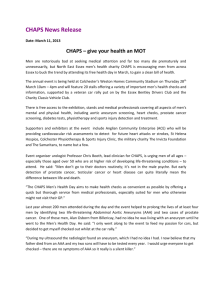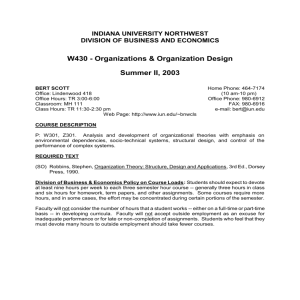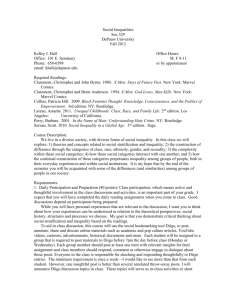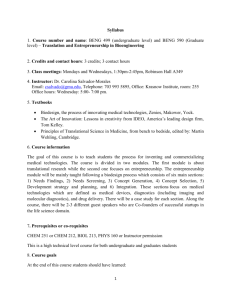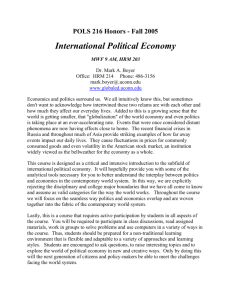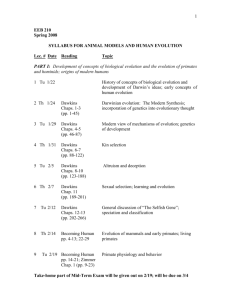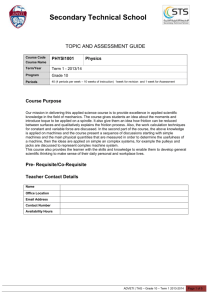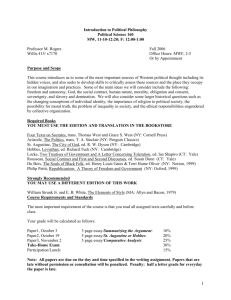HIST 339 Britain and the Great War Dr. Grenier Fall, 2014 Office
advertisement
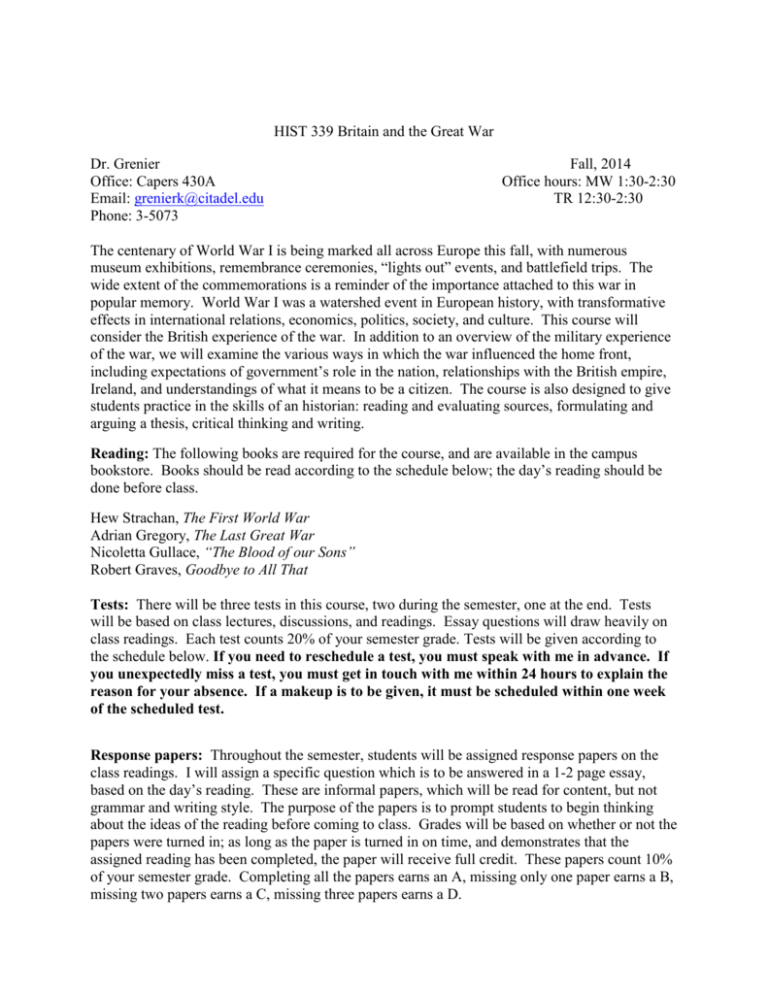
HIST 339 Britain and the Great War Dr. Grenier Office: Capers 430A Email: grenierk@citadel.edu Phone: 3-5073 Fall, 2014 Office hours: MW 1:30-2:30 TR 12:30-2:30 The centenary of World War I is being marked all across Europe this fall, with numerous museum exhibitions, remembrance ceremonies, “lights out” events, and battlefield trips. The wide extent of the commemorations is a reminder of the importance attached to this war in popular memory. World War I was a watershed event in European history, with transformative effects in international relations, economics, politics, society, and culture. This course will consider the British experience of the war. In addition to an overview of the military experience of the war, we will examine the various ways in which the war influenced the home front, including expectations of government’s role in the nation, relationships with the British empire, Ireland, and understandings of what it means to be a citizen. The course is also designed to give students practice in the skills of an historian: reading and evaluating sources, formulating and arguing a thesis, critical thinking and writing. Reading: The following books are required for the course, and are available in the campus bookstore. Books should be read according to the schedule below; the day’s reading should be done before class. Hew Strachan, The First World War Adrian Gregory, The Last Great War Nicoletta Gullace, “The Blood of our Sons” Robert Graves, Goodbye to All That Tests: There will be three tests in this course, two during the semester, one at the end. Tests will be based on class lectures, discussions, and readings. Essay questions will draw heavily on class readings. Each test counts 20% of your semester grade. Tests will be given according to the schedule below. If you need to reschedule a test, you must speak with me in advance. If you unexpectedly miss a test, you must get in touch with me within 24 hours to explain the reason for your absence. If a makeup is to be given, it must be scheduled within one week of the scheduled test. Response papers: Throughout the semester, students will be assigned response papers on the class readings. I will assign a specific question which is to be answered in a 1-2 page essay, based on the day’s reading. These are informal papers, which will be read for content, but not grammar and writing style. The purpose of the papers is to prompt students to begin thinking about the ideas of the reading before coming to class. Grades will be based on whether or not the papers were turned in; as long as the paper is turned in on time, and demonstrates that the assigned reading has been completed, the paper will receive full credit. These papers count 10% of your semester grade. Completing all the papers earns an A, missing only one paper earns a B, missing two papers earns a C, missing three papers earns a D. Operation War Diary paper: The major paper for this class will be based on students’ participation in the British National Archives crowdsourcing project, Operation War Diary. The National Archives, working with the Imperial War Museum, has digitized numerous war diaries from units under the command of British and Indian cavalry and infantry on the Western Front. They are asking individuals to help tag the diaries so they, and other historians, can put together a fuller picture of the war. See www.operationwardiary.org. In this course, students will be asked to tag 15 pages of a diary, and write a paper based on their experiences with this project and their findings as they read the diary. This paper will be 10-12 pages long, typed, and will be worth 20% of your semester grade. More information will come later in the semester. Class participation: All students are expected to participate fully in the life of the course. Participation is defined as attendance, attentiveness, taking part in discussions, and asking questions in class. While there is no formal grade for participation, it is a basic course requirement, and if a student’s course average is on the borderline between two grades, it is participation which will make the difference. Remember that The Citadel has a mandatory attendance policy. While the Commandant’s Office can at times excuse students from the military consequences of missing class, it cannot excuse them from the academic consequences. Missing more than four classes, for any reason other than illness, will have negative consequences upon your grade. And, in accordance with college policy, missing more than 20% of classes can result in withdrawal from the course. Please note that tobacco products are not allowed in class, according to college policy. Cell phones must be turned off (or to “silent”) and put away. Laptop computers can only be used for notetaking, and are not recommended. Course Schedule Aug. 27: introduction Aug. 29: views of the war Reading: Gregory, introduction Sep. 1-3: pre-war Britain Sep. 5-8: war begins Reading: Gregory, chap. 1 Sep. 10-12: fall 1914 campaigns Reading: Strachan, chaps 1, 2 Sep. 15-19: Recruitment and propaganda Reading: Gregory, chaps. 2, 3, Gullace, chaps. 1, 2. Sep. 22: Domestic politics Sep. 24-26: spring 1915 and Gallipoli Reading: Strachan, chaps. 3, 4 Sep. 29: TEST #1 Oct. 1-3: British colonies and war Oct. 6-10: trench warfare Reading: Strachan, chaps. 5, 6 Oct. 13- 15: Easter Rising, 1916 Oct. 17-20: Western front, 1916 and the Somme Reading: Strachan, chap. 7 Oct. 22 – Leadership Day, no class Oct. 24: Reading: Graves, chaps. 1-23 Oct. 27 - 31: Home front and the economy Reading: Gregory, chaps. 4-6 Nov. 3: TEST #2 Nov. 5-10: Western front in 1917 Reading: Strachan, chap. 8 Nov. 12: Reading: Gullace, chaps. 3-8 Nov. 14-17: Lawrence of Arabia and the war in the Mideast Nov. 19-21: War poetry Dec. 1-3: 1918 Reading: Strachan, chaps. 9, 10 Dec. 5-10: Post war and Remembrance Reading: Gregory, chaps. 7, 8 Operation War Diary paper due Dec. 8 Final exam: Sat. Dec. 13, 8:00
